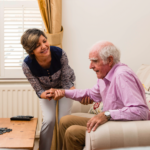Hip Replacement Recovery
Our hip replacement recovery tips will help make your life a lot easier post-surgery.
Hip Replacement Recovery Tips
A staggering 160,000 total knee and hip replacement surgical procedures are performed each year in England and Wales. The hip replacement surgery can improve mobility, function and wellbeing but it can take a little time to recover from a hipe replacement and get back on your feet.
The idea of surgery can be frightening and the recovery may look like a long and difficult road. However, the good news is that most people recover rapidly after hip replacement surgery, and without the pain in your hip to drag you down, you’ll soon have a spring in your step again.
When you’re preparing for the operation, a little early planning can make life so much easier in the long run.
1. Make life easy
- Set your bedroom and your house up so that all the most important stuff is easily accessible.
- Try to avoid bending down into cupboards or stretching to reach items, you’ll be at risk of falls and injuries.
- Move clothes, wash bags and food that you use daily into a spot that you can easily access.
2. Fill the freezer
Recovering from the operation can mean that it’s difficult to get out to the shops and cook nutritious meals. Plan ahead and fill the fridge, freezer and store-cupboard with healthy and easy to prepare snacks and meals.
It can be a good idea to set up some online shops in advance too. You’ll stay topped up with fresh produce and you’ll never be caught short of toilet paper, milk and tea bags.
3. A helping hand
It can be lonely when you’re home alone and can’t get out and about. If you live alone, try and drum-up help and support from family and friends.
Alternatively, consider employing a carer to come into your home for a short time, to help with chores, provide practical support and offer a little company while you focus on getting better. hometouch can allow you to choose the right caregivers – both live-in and hourly – safe in the knowledge that all the necessary checks have been done and their references have been followed up.
4. Get a gadget
It’s important to move around when you’re recovering from a hip replacement operation.
You’ll need a little help at first. In the hospital, the physiotherapist will offer support and guidance that will allow you to use a frame, and 2-6 weeks after the operation you should be walking with a stick.
With this in mind, it can be tricky to carry things around when your hands are otherwise engaged. A walking tea trolley can be a worth every penny or see if you can beg, borrow or hire one.
It can make living a normal active life at home a little bit easier.
5. Bin the bad habits
- Smoking can affect your wound healing and increase the risk of chest infections after the anaesthetic.
- Too much alcohol can increase the risk of bleeding, not to mention putting you in danger of stumbles and falls when you’re recovering at home.
I know it’s tough, but try and avoid smoking and drinking for two weeks before the operation and during your recovery. Your body will thank you for it.
Recovering well from hip replacement surgery
When you’re in the hospital the surgeons, nurses and physiotherapists will all work together with you to get you up and out of bed and back on your feet.
But you are in control of your open body and there’s lots that you can do to help support and speed up the recovery process:
Nourish your body
Choose a balanced diet so that your body has all the nutrients needed for healthy healing. Calcium and vitamin D are essential for strong bones, so choose lots of dairy produce and oily fish to boost levels of these particular vitamins.
It can also help to get a little gentle sunlight; the body can make Vitamin D in the sunshine, so if the weather’s warm, enjoy a cup of tea in the garden.
The fall factor
After the operation, you’ll be unsteady on your feet and at risk of falls. Stay safe by:
- Wearing proper footwear with support and non-slip soles
- Clearing the floor so that there are clear paths and no objects to trip you up
- Lighting the way. Make sure there is good lighting, especially at night
- Putting your walking aid at arms-length, close to your bed so that you can reach it easily
Stay regular
The painkillers can bung you up, keep your bowels moving with plenty of fibre and lots of fluids too.
Steady progress
You need to move and challenge yourself to get back to full function. Build-up gradually, slowly increasing the number of things you do.
Understand that these may drain and tire you out initially, so get plenty of rest and then try again. You’ll get there with time.




